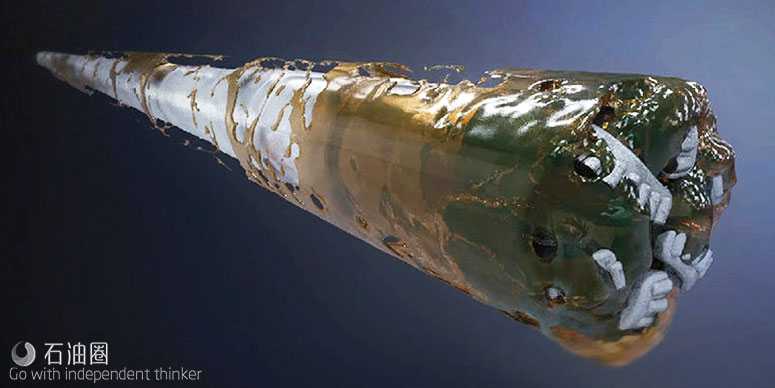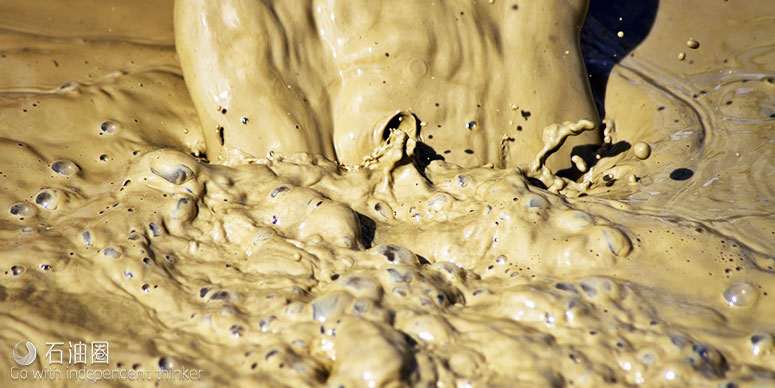HYDRO-GUARD® System
Baroid’s HYDRO-GUARD® water-based drilling fluid system provides maximum shale stabilization in highly reactive clays, with proven high performance in deepwater operations. Engineered for reliable inhibition and maximum drilling performance, this system can provide wellbore stability, high rates of penetration, and acceptable rheological properties over a wide range of temperatures. The system remains stable from 30°F through 300°F (-1°C through 148°C) up to 16.5 ppg, a first for a clay-free, low-solids, non-dispersed polymer drilling fluid system.
Ideal for use in environmentally sensitive areas
HYDRO-GUARD water-based fluid offers several environmental and safety advantages over oil- and synthetic-based fluids, making it ideal for use in environmentally sensitive areas. With the benefit of allowing cuttings discharge based upon environmental restrictions the HYDRO-GUARD system delivers economic value in deepwater, shelf, and inland waters or on land. Since no oil is used in the formulation, the HYDRO-GUARD system eliminates the need for cuttings processing, monitoring equipment, and extra personnel, reducing overall drilling costs.
OVERVIEW
A gas field in Pakistan is a major resource for sustainable domestic energy supply. Given its significance, this mature field development has employed many leading technologies to enhance and maintain gas production, including high-angle, extended-reach, lateral well completions. The gas reserves are concentrated in the regionally extensive Habib Rahi Limestone, Sui Main Limestone (SML), and Sui Upper Limestone (SUL). These carbonate units are interbedded with, and overlain by, reactive and fractured shale horizons that give rise to technical challenges for drilling operations, particularly for high-angle wells.
CHALLENGES
In this case, the operator had experienced extensive well stability issues in the Habib Rahi Limestone due to swelling clays, shale sloughing, and bit balling while drilling 70-degree 12- 1/4-inch sections and 90-degree 8-1/2-inch sections in offset wells. Further problems were encountered during tripping operations, including tight spots and overpull, necessitating considerable time back-reaming.
The operator needed a solution to help deliver on its scheduled well program and gas production commitments. The drilling fluid solution had to combat the reactive clays and preserve hole quality to maximize hole-cleaning efficiency and penetration rates, and to ensure that production casing was successfully landed at total depth (TD).
SOLUTION
Working in close collaboration with the customer, Baroid proposed its high-performance, water-based HYDRO-GUARD® system. The HYDRO-GUARD system employs a trio of clay inhibitors whose concentrations are customized to the characteristics of the specific unstable shale formations. Baroid additionally proposed hole-cleaning sweeps, using BAROLIFT® sweeping agent, a recognized aide to help maintain optimum drilling conditions.
For the reactive and unstable shales overlying and interbedded with the Habib Rahi Limestone, laboratory testing on representative shale cuttings indicated the optimum concentration of HYDRO-GUARD inhibitors. Additionally, Baroid recommended using 7 volume percent of potassium chloride (KCl) and 1.5 volume percent of BaraLube® W-839 lubricant to further stabilize the clay and lubricate the sys.
In field application, the HYDRO-GUARD system helped deliver significant success for the operator. No bit balling or shale sloughing issues were observed; in wiper trips, hole conditions were good and the holes were slick.
Rate of penetration (ROP) through the 70-degree 12-1/4-inch section and 90-degree 8-1/2-inch section was, on average, 20 percent higher than in offset wells due to the stable well conditions and effective hole cleaning assisted by regular BAROLIFT sweeps. No tight spots, overpulls, or hang-ups were encountered on tripping, thus avoiding the need for back-reaming. Production casing was landed and cemented successfully at section TD. A further consequence of stable hole conditions included significantly lower fluid dilution volumes to maintain and condition the drilling fluid; this positively impacted total drilling fluid costs to the operator.
RESULTS
Significant cost savings and operational efficiencies were realized using the HYDRO-GUARD system relative to offset wells and earlier experience with competitor mud systems.
The first well using the HYDRO-GUARD system was completed in a record 10.8 days without any nonproductive time (NPT), significantly below the customer’s estimated well plan and at 15 percent lower total drilling fluid costs.
The operator conservatively saved 2.5 drilling days and 5 well testing days; by assuming a rig rate of USD 40,000/day, the estimated savings using the HYDRO-GUARD system was USD 300,000.
Early well tests demonstrated significantly lower cleanup time (2 days vs. 7 days) and higher production rates than the next nearest analogous offset well. Importantly, this underscores how fluid quality – particularly a highly inhibitive, non-dispersed system – minimizes formation damage and preserves reservoir permeability.

 石油圈
石油圈

